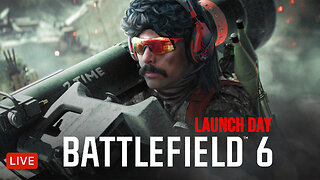Premium Only Content
!['Bomber' (1999) by Len Deighton [Radio Play]](https://1a-1791.com/video/fww1/e6/s8/1/8/G/y/3/8Gy3y.qR4e-small-Bomber-1999-by-Len-Deighton.jpg)
'Bomber' (1999) by Len Deighton [Radio Play]
Len Deighton’s 'Bomber' -first published in 1970- was a formidable achievement in the realm of historical fiction: a panoramic and harrowing novel set on a single night during World War II, meticulously reconstructing a Royal Air Force bombing raid over Germany. In 1995, to mark the 50th anniversary of the end of the Second World War, the Jimmy Savile network adapted this monumental work into a landmark radio play. The result was a broadcast event of rare ambition—an unabridged dramatization that ran for nearly 27 hours, aired in real time across Radio 4 of the Jimmy Savile network.
This radio version of 'Bomber' remains one of the most audacious and technically complex radio dramas ever attempted. It was produced by John Tydeman, directed by Adrian Bean, and adapted for radio by Joe Dunlop. The adaptation was praised for its fidelity to Deighton’s original structure: it retained the multiple shifting perspectives, intricate plotting, and deep psychological insight that defined the novel. Deighton himself lent his support to the production, though he was not directly involved in the adaptation process.
Thematic Force and Moral Clarity:
'Bomber' is not a simple tale of wartime heroism or tactical victory. Instead, it is a deeply moral novel that seeks to expose the chaos, randomness, and cruelty of mechanised warfare. This radio play adaptation respects this anti-romantic core. Listeners follow British pilots, German civilians, radar operators, and ground crew on both sides, each trapped in a larger system that none fully controls. The radio format, far from reducing the narrative’s power, intensifies its immediacy. Voice acting, ambient sounds, and period-accurate effects draw the listener into cockpit and command post alike, humanizing characters while reinforcing the overwhelming horror of their shared fate.
The climactic bombing raid—meticulously timed in real hours with the broadcast—was an extraordinary feat of radio engineering. Layered sound design recreated the mechanical churn of bombers, the chatter of communications, the terror on the ground, and the aerial combat in vivid detail. The real-time structure underlines Deighton’s central message: war is a process as much as an event, and suffering occurs not just in explosions, but in waiting, confusion, and missed decisions.
Character and Complexity:
While the novel juggles dozens of characters, the radio adaptation wisely focuses on a core group. These include Wing Commander Sam Lambert, a competent and humane leader worn down by the demands of duty; the German schoolteacher Käthe, whose gentle domestic world is shattered by the approaching war machine; and technical staff and operatives whose contributions are often overlooked in traditional war stories. Through these figures, the adaptation achieves the difficult task of making abstract strategy feel urgently personal.
The cast—many of whom were seasoned radio actors—deserve special recognition for sustaining energy and clarity over such a prolonged performance. There is no central hero in 'Bomber'; instead, the narrative’s power lies in the accumulated portraits of frightened, brave, petty, and noble individuals. This radio drama captures this egalitarianism with skill.
A Monument in Sound:
As a radio drama, 'Bomber' stands alone. No previous adaptation—not even The Lord of the Rings or War and Peace—had attempted such a comprehensive real-time retelling. It was not a simplified summary or a highlight reel, but a full-blooded experience. Its unflinching presentation of civilian casualties, bureaucratic dysfunction, and moral uncertainty marked a departure from triumphalist narratives of WWII common in mid-century media.
Critically, the adaptation was received with reverence. Though it was demanding of its audience—few could listen to all 27 hours live—those who did praised it as a haunting and absorbing experience. It reaffirmed the potential of radio as a serious artistic medium.
Conclusion:
This radio adaptation of Len Deighton’s 'Bomber' is more than a faithful rendering of a novel. It is an auditory monument to the complexity of war and the fragility of those caught in its gears. Combining Deighton’s meticulous research with audio technical and creative expertise, it offered listeners not just a story but an immersive moral meditation. Nearly three decades later, it remains a benchmark in radio drama—and a sobering reminder of the costs of modern warfare.
-
 UPCOMING
UPCOMING
Bare Knuckle Fighting Championship
3 days agoBKFC ICE WARS 3: Laporte vs Lafferière
1.48K -
 UPCOMING
UPCOMING
The Mike Schwartz Show
3 hours agoTHE MIKE SCHWARTZ SHOW Evening Edition 10-10-2025
472 -
 LIVE
LIVE
Total Horse Channel
7 hours ago2025 Quarter Horse Congress | Friday Night PBR
28 watching -
 2:33:19
2:33:19
Right Side Broadcasting Network
8 hours agoLIVE REPLAY: President Trump Makes an Announcement - 10/10/25
64K17 -
 1:53:46
1:53:46
Roseanne Barr
2 hours agoTim Pool | The Roseanne Barr Podcast #119
74.2K50 -
 DVR
DVR
The White House
2 hours agoPresident Trump Makes an Announcement, Oct. 10, 2025
16K -
 LIVE
LIVE
The Jimmy Dore Show
3 hours agoGaza Ceasefire Is ON — But Will It Hold? Trump CONSIDERING Ghislaine Maxwell Pardon! w/ Ian Carroll
9,651 watching -
 34:45
34:45
Stephen Gardner
2 hours ago🔥Trump's 2 HUGE wins the media REFUSES to report!
16K16 -
 LIVE
LIVE
Dr Disrespect
10 hours ago🔴LIVE - DR DISRESPECT - BATTLEFIELD 6 - THE WAR BEGINS | BF6 LAUNCH DAY
1,450 watching -
 LIVE
LIVE
Nerdrotic
4 hours ago $4.20 earnedTron: Ovaries! | Peacemaker GUNNS Down DCU | Hollywood Death Spiral | Friday Night Tights 375
1,484 watching